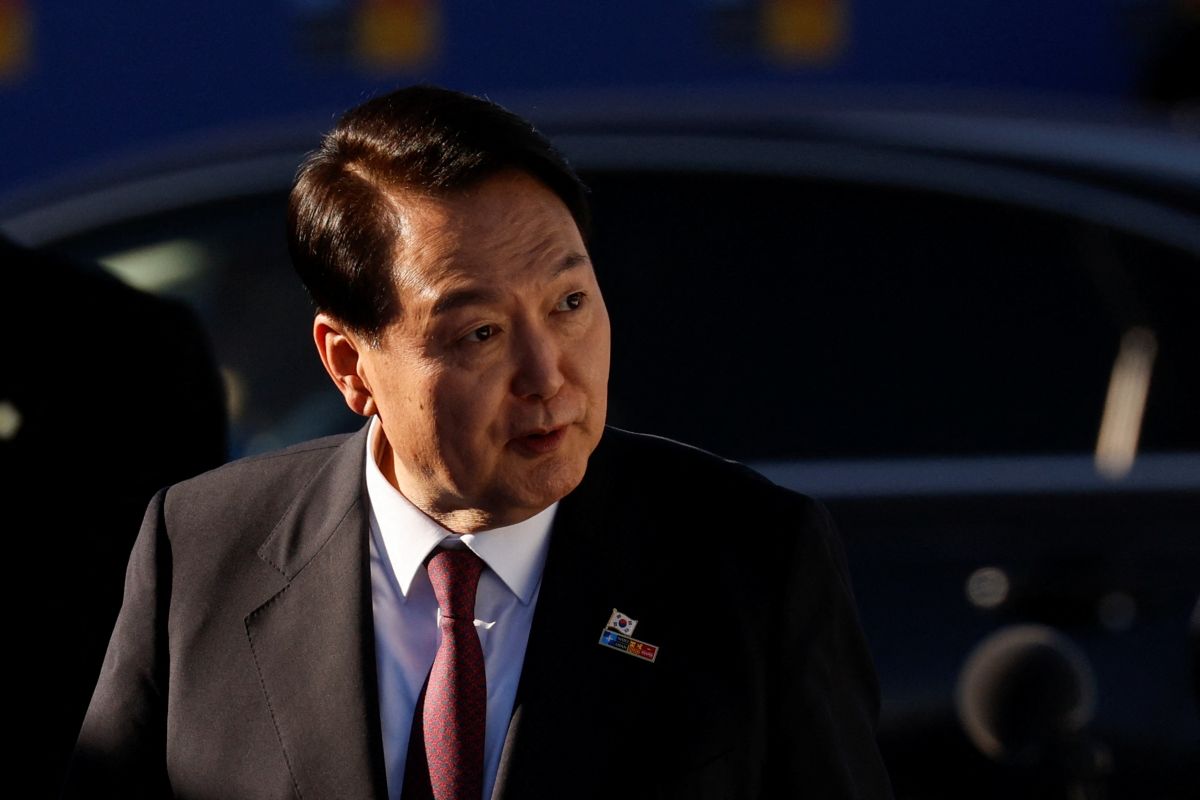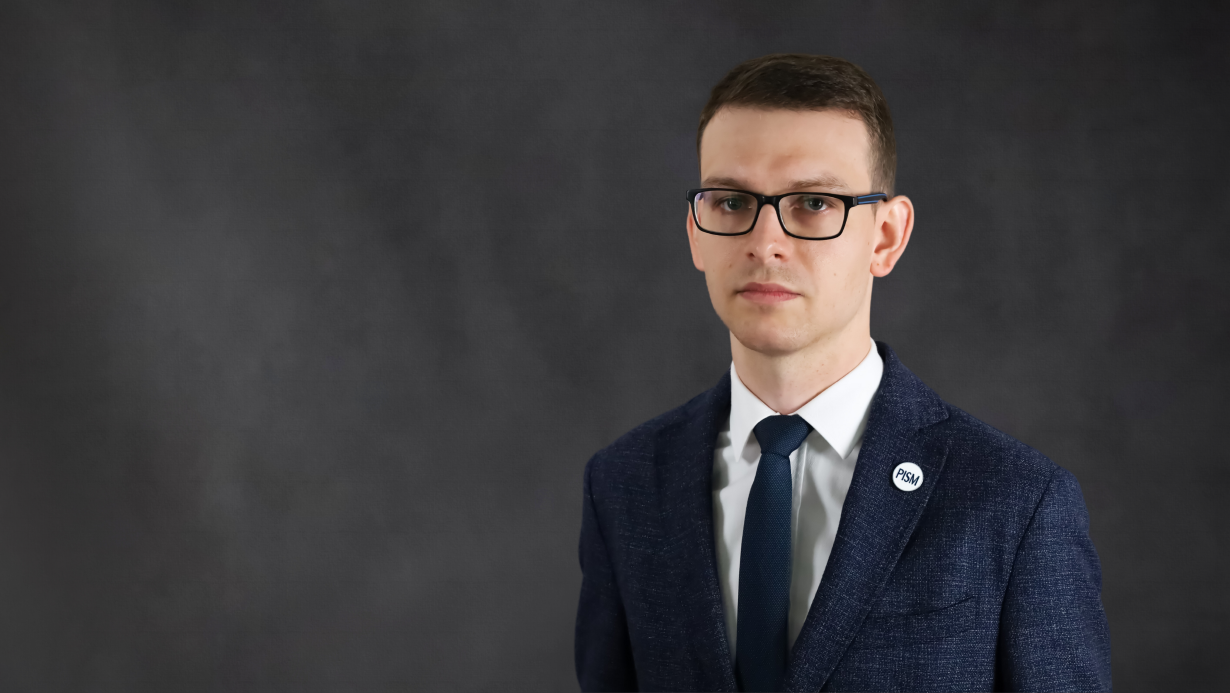Opportunities and Challenges of South Korea's Foreign Policy under Yoon Suk-yeol
The new president of South Korea, Yoon Suk-yeol, intends to lean his foreign policy on close relations with the U.S. He wants to replicate the tough attitude of earlier conservative governments towards North Korea, focusing primarily on deterrence. Yoon’s presidency offers an opportunity to improve relations with Japan. The credibility test of the new government, which declares stronger cooperation with the West, will be more determined policy towards China and Russia, increased support for Ukraine, and deepened cooperation with NATO and its members, including Poland.
 SUSANA VERA/ Reuters/ FORUM
SUSANA VERA/ Reuters/ FORUM
Yoon Suk-yeol’s participation in the June NATO summit was the first foreign visit of the new South Korean president, who took office on 10 May. The slight victory for the candidate of the conservative People Power Party in the March elections (he beat his rival Lee Jae-myung of the liberal Democratic Party by 0.73 percentage points) confirmed the polarisation of South Korean society. The implementation of the new government’s policy will be hampered by the balance of power in the parliament where the Democratic Party will hold the majority until at least 2024. In foreign policy, Yoon will rely on advisers and officials from Lee Myung-bak’s conservative administration (2008-2013) working towards deepening cooperation with the U.S. In his inaugural speech, Yoon emphasised that South Korea should play a greater role globally, and its foreign policy is to be based on cooperation with countries sharing values such as liberal democracy, market economy, and human rights. The main directions of the foreign policy of the new government will be North Korea, the U.S., China, and Japan.
Policy towards North Korea
Yoon’s North Korea policy is designed to respond to the growing military threats from the North. The new administration believes that further missile tests and a nuclear test by North Korea are inevitable, and does not rule out conventional border provocations. In response to these challenges, South Korea intends to strengthen defence and deterrence based on the development of its own capabilities, including missile defence, and cooperation with the U.S. This was confirmed by Yoon’s meeting with U.S. President Joe Biden in Seoul in May, the emphasis of which was much more on strengthening deterrence against North Korea than on the policy of engagement and dialogue pursued by former President Moon Jae-in.
The Yoon administration advocates the denuclearisation of North Korea. Using this term instead of “denuclearising the Korean peninsula” suggests a retreat from the previous administration’s conciliatory stance towards demanding unilateral disarmament of the North. It also reflects the belief that incentives, such as easing sanctions, remain ineffective due to North Korea’s lack of interest in dialogue. However, in order to avoid accusations of passivity by the opposition, Yoon remains seemingly open to talks with North Korea, offering it economic support in exchange for denuclearisation. It is a proposal that duplicates the ineffective initiatives of the Lee Myung-bak administration. The new authorities are also proposing to provide humanitarian aid, including vaccines, in connection with the confirmation of COVID-19 cases in North Korea.
Tilting towards the U.S. in its Rivalry with China
The Yoon administration perceives the alliance with the U.S. as the foundation of South Korea’s foreign policy. In addition to strengthening its pillars related to deterrence of North Korea, the Yoon-Biden summit confirmed the growing importance of economic issues in South Korea-U.S. relations. South Korea’s joining the Indo-Pacific Economic Framework (IPEF) demonstrates its will to set standards for trade and supply chains jointly with the U.S. and its regional partners. South Korea also intends to cooperate with the U.S. in the production of batteries and electric vehicles (Hyundai Motor’s investment in Georgia is worth $5.5 billion) and semiconductors (Samsung Electronics investment in Texas is worth $17 billion). In technological cooperation with the U.S., South Korea sees a way to increase its potential in the face of competition from China. A separate area of cooperation is the development of small modular reactors (SMRs), which, apart from energy issues, may pave the way for South Korea in the long term to build nuclear submarines, for which the authorities have been striving for years as part of building independent defence capabilities.
The democratic and free-market rhetoric and the pro-American orientation of the Yoon administration will favour South Korea’s increasing advocacy on the U.S. side in its rivalry with China. This will be manifested by more frequent South Korean participation in multilateral drills in the Indo-Pacific with American partners and allies, and by deepening cooperation with Quad countries in areas such as maritime security, cybersecurity, new technologies, and mitigating climate change. The announcement of the publication of its own Indo-Pacific strategy by the end of the year signals that the approach of South Korea will be more in line with U.S. policy in the region. However, strengthening cooperation with the U.S. may be limited by the strong economic interdependence between South Korea and China. For example, Samsung Electronics and SK hynix have semiconductor manufacturing plants in China, and at least 60% of the materials and parts for South Korean batteries and electric vehicles are imported from China.
Chance of a New Opening with Japan
Yoon announced it would seek an improvement in relations with Japan, which have deteriorated in recent years in part over historical disputes. This aim stems from South Korea’s willingness to join the Comprehensive and Progressive Agreement for Trans-Pacific Partnership (CPTPP) led by Japan, which would serve to diversify trade and investment and thus reduce the dependence on China. Better relations with Japan also would help improve security in the region. That is why the Yoon administration promises to separate historical disputes from current politics, strengthen bilateral intelligence cooperation in response to threats from North Korea, and deepen trilateral cooperation with the U.S. and Japan. During the Shangri-La Dialogue in Singapore in June, defence ministers of these three countries announced the resumption of joint missile defence exercises (suspended in 2017) in response to North Korea’s missile development. For the first time in history, they also jointly emphasised the importance of peace and stability in the Taiwan Strait.
Improving South Korea’s relations with Japan may be hampered mainly by disputes over compensation for Korean forced labourers during the Japanese occupation (1910-1945) and the territorial dispute over the Dokdo/Takeshima islands. These tensions translate into mutual dislike in both societies (63% of Koreans and 49% of Japanese, respectively, have an unfavourable attitude towards the other) and the resistance of the hawks in the Japanese government of Kishida against adopting a conciliatory stance, especially in the face of the July elections to the House of Councillors.
Conclusions and Perspectives
South Korea deepens its cooperation with the U.S. in connection with the intensified U.S.-China rivalry and the growing threats from North Korea. This direction results from the conservatives’ belief that maintaining the policy of balance between the U.S. and China, conducted in the first years of the Moon Jae-in administration, would be detrimental to the alliance and inadequate in view of the deterioration of relations with China, which is treated as a serious economic and security challenge to South Korea. The lean towards the U.S. in its rivalry with China does not mean, however, that South Korea will adopt a confrontational attitude towards China because of the economic interdependence.
Strengthening the alliance with the U.S. and South Korea’s ambitions to play a greater role in the world offer opportunities for deepening cooperation with the West, including NATO. This was confirmed by its joining in May this year—as the first Asian state—NATO’s Cooperative Cyber Defence Centre of Excellence, along with the announced establishment of a diplomatic mission at NATO headquarters in Brussels and Yoon’s participation in the June summit in Madrid. South Korea’s plans beyond the region may be thwarted by the likely North Korean missile and nuclear tests, which will force the South to focus on its immediate surroundings. However, the initiation of an inter-Korean dialogue by the Yoon administration is unlikely.
South Korea will maintain its current position on Russia’s aggression towards Ukraine. The government in Seoul announced that it will continue sanctions against Russia and increase humanitarian aid for Ukraine, but remains cautious about supplying weapons as the U.S. urges them to do. South Korea may fear that in response to weapons support, Russia could give technical support to North Korea in the development of its missile potential. Yoon’s government is more inclined to support countries that supply weapons to Ukraine. This is evidenced by the considered sale of artillery ammunition at lower costs to Canada, which had delivered such ammunition to Ukraine.
South Korea intends to develop cooperation with Poland and other Central European countries. The investments will remain a pillar of engagement of South Korea, which also counts on participation in the construction of nuclear power plants in Czechia and Poland. The war in Ukraine is also a stimulus for the South Korean arms industry, which offers its products to the countries of NATO’s Eastern Flank. This was confirmed by the visit of the Polish minister of defence to South Korea in spring this year. The planned purchase of South Korean weapons, such as tanks, armoured personnel carriers, and infantry fighting vehicles, and with the option of cooperation between defence industries in their production, is part of plans to modernise the Polish armed forces. Poland’s cooperation with South Korea in the production of Krab self-propelled howitzers and their sale to Ukraine shows that cooperation with South Korean partners may increase the export potential of the Polish defence industry.




_sm.jpg)